
demented time
getting lost in space
As part of the Magic Carpet 2.0 option studio at UBC SALA, Heidi Evans explored the spatial and emotional dimensions of dementia through the lens of memory, identity, and domestic space. Drawing on cinematic references such as The Father and visual strategies from M.C. Escher and Bauhaus weaver Gunta Stölzl, the project proposed an alternative vision for elder care environments. Juxtaposing layered personal narratives with architectural research, the work reimagined the nursing home as a spatial archive — constructed through memories, familiar objects, and everyday rituals.Heidi’s design challenges institutional conventions by framing space not as static containment, but as a dynamic interface between past, present, and identity.




